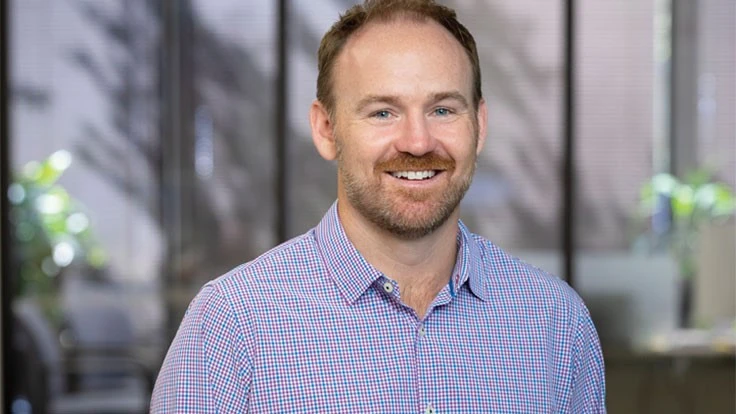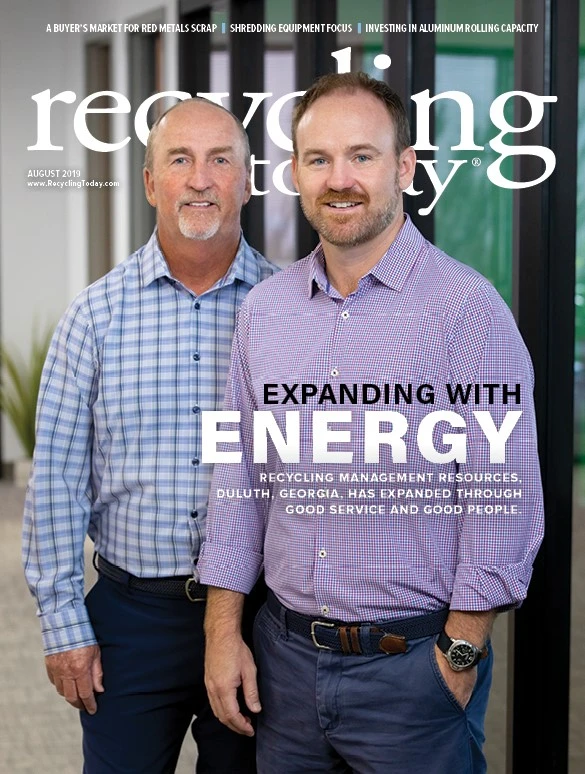
Photos by Chris Hamilton Photography

Recycling Management Resources (RMR), headquartered in Duluth, Georgia, is a fairly new name in the recycling industry. The company launched in 2008 as a commercial paper recycler, operating a single, 20,000-square-foot facility in Raleigh, North Carolina. Only five people worked for the company in that first year of business.
Reece Whitley, managing partner and president at RMR, first had the idea for RMR and helped the company get its start. Before launching RMR, Whitley held various sales positions at Wilmington Paper Corp., Pine Brook, New Jersey. While at Wilmington, Whitley says he noticed a lack of recycling plants that offered a high level of service to brokers and industrial accounts.
So, during Thanksgiving 2007, he shared this idea with his father, Mitch Whitley, who worked as a general manager for Austell, Georgia-based Caraustar’s Recovered Fiber Group at the time. The idea was then pitched to Stuart Lurie, president of Wilmington, that both Reece and his father would partner with Wilmington Paper to start their own recycling plant.
RMR launched Jan. 1, 2008, in Raleigh, and it opened for business by that May.
In a matter of a decade, the company has expanded to eight facilities and multiplied its staff to about 250 employees across those sites. It has a presence across several Southeast and mid-Atlantic states. RMR handles 50 different commodities, with a high concentration of commercial paper grades.
However, Reece says most of the company’s growth can be attributed to his team and the level of service those team members provide.
“We have 250 good, smart people who want to grow,” he says of the company. “And at RMR, we provide what we feel like is a higher level of service. To me, the success we have had is measured in the people who work with us. They believe in us and love the company and want to be here,” Reece adds.
Filling a void
Just before starting RMR, Reece says he felt like there “was a void” in terms of recycling plants that were providing a high level of service. As a result, he says he saw an opportunity for him, his father and a small team to start their own recycling plant to service Wilmington Paper, where Reece was working at the time.
Recovered fiber markets were tough in 2008, though, and the Great Recession began in the middle of the year. There was uncertainty about economic conditions, yet Mitch says RMR was too small and new to be hurt much. “We were able to weather that storm because we weren’t big at that time,” he says. “We only bought and sold about 600 tons a month.”
Reece adds that low old corrugated containers (OCC) prices were concerning—he recalls selling OCC for only $1 a ton, but that being small and new allowed RMR to step in to service prospective customers who weren’t being served.
“Competitors were not picking up supply, so they started calling us,” Reece says. “It was an opportunity for us to step in and say, ‘We can come over and pick up your cardboard. We can’t pay anything, but we will pick it up.’ We were able to meet new people, new supply and gain business through that time. We couldn’t sell product for very much money. But we were so small. We had five employees. We didn’t have huge payrolls. We had a small warehouse with a small rent payment. It was good fortune, and we were able to make it through.”
Natural expansion
By the end of 2008, RMR’s Raleigh plant went from processing about 600 tons of material per month to more than 2,000 tons per month. “We increased the level of service, and we increased the level of business,” Reece says. “Once we saw that we had been successful with [the Raleigh plant], we decided to do it again.”
In 2009, the company saw opportunities to expand outside of Raleigh. As the U.S. was still faced with an economic recession, Reece says it wasn’t hard to find cheap warehouse space, and equipment providers were offering discounts. He says the cost of opening new facilities was low, so it provided RMR a good opportunity to enter new markets.
As Reece was still phasing out of his position at Wilmington in 2009, he says he noticed accounts that needed better service in Louisville, Kentucky. In July 2009, RMR expanded and opened a facility there.

RMR steadily expanded into different communities in Southeast and mid- Atlantic states. In November 2010, the company started its third facility, which opened in High Point, North Carolina. One year later, RMR took over a facility in Philadelphia for Northstar Recycling. In January 2012, the company opened a plant in Atlanta. A few years later, RMR opened a facility in Barton, Alabama. The company acquired a few sites in 2018, as well. “We were fortunate to grow quickly,” says James Stull, executive vice president of operations at RMR.
Stull joined RMR when it only operated two facilities, and he helped to open the company’s High Point facility. “There were some growing pains that came with that; you don’t have all the people you need to [grow] effectively. Now, we have eight facilities, and it’s a much easier go than it was.”
In addition to opening new facilities, RMR added many new people to its team this past decade. Melanie Harman, executive vice president of marketing at RMR, says a blend of industry veterans and people new to the industry work at RMR.
“Every recycling operation today is inundated with challenges. You just keep working on the problems.” – Reece Whitley, managing partner and president, Recycling Management Resources
“It’s a nice blend,” she says. “It keeps us traditional, yet young and energized. It’s a nice combination of talent. We adapt and we grow.”
Harman adds that RMR has gone from a “relatively small, quiet family-owned base to busy.”
Yet, even with the growth, Mitch says the way the company does business has remained the same. “We’ll conduct business in a mutually respectful manner,” he says. “That’s what we try to maintain through our growth.”

Acquiring ahead
For the first few years of business, Reece says the company was not thinking about acquisitions. He says RMR focused on expanding into new areas that offered “captive tonnage,” and he focused on hiring a strong team of people.
A few years ago, Reece says RMR hit a point where it had a strong management team and the infrastructure to consider acquisition opportunities. In January 2018, RMR acquired National Paper, which operated three plants near Philadelphia. “That was our first big acquisition move,” Stull says.
“[We have] a nice blend [of talent]. It keeps us traditional, yet young and energized.” – Melanie Harman, executive vice president of marketing, Recycling Management Resources
Harman describes this first acquisition as a learning experience for the company. Prior to joining RMR, Harman had worked for many years at International Paper (IP), headquartered in Memphis, Tennessee. She says doing an acquisition with a newer company had a much different feel than what she had experienced at IP.
“When you do an acquisition in the corporate world, you have your ducks in a row,” she says. “RMR had none of that support. It was me, James, Mitch, Reece and Kim [Whitley].”
After acquiring National Paper, RMR decided to relocate the three acquired plants and install all new equipment in them. Two of the sites handle commercial single-stream material, so Harman says the company had to make sure that site was equipped for that kind of material.
Although acquiring three National Paper sites was an investment, Harman says it ultimately helped to grow RMR’s volume significantly. It was also a natural expansion of the company’s existing footprint. Harman adds that the acquisition helped to teach RMR more about its strengths and weaknesses. She says the experience felt like learning to walk after crawling. “You get bruises. But the good news is that we know for when we do it again.”
Stull adds that RMR plans to continue to grow aggressively in the future. “Some of that will be organic growth, some acquisitions,” he says. “Our plans are to target new opportunities.”

Ready to serve
Today’s current market conditions for recovered fiber somewhat reflect what was seen during RMR’s start. Average OCC prices are at about $25 per ton in the July buying period, according to Fastmarkets RISI’s PPI Pulp & Paper Week. Even for RMR, recovered fiber inventories are higher than normal and movement is slower than normal.
However, Reece says solving problems—like how to survive tough market conditions—is a routine thing for him and his team at RMR.
“Every recycling operation today is inundated with challenges,” he says. “You just keep working on the problems. If you can survive and maybe even prosper a little bit in these types of times, then in the good times, your business will be stronger.”
Mitch adds that RMR has remained stable despite the current market conditions. It plans to do that by focusing on serving its partners. “You stay true to what you do,” he says. “You still service and supply needs. You get people paid on time. You do what you say you’ll do. You continue to stand by the fundamentals of your business.
“Service is what sets us apart,” he adds. “If a supplier has a need, we’ll do everything in our power to satisfy that need. Maybe bigger companies might not pay as much attention to that, but in flat markets, it’s all about the supplier.”
Reece attributes much of the company’s ability to thrive on the employees, many of whom have been with the company since it started about a decade ago. He adds that many employees have had the opportunity to grow in their roles as the company has grown.
“In 2010, we hired young folks, college graduates,” Reece says. “These guys might have started out on the plant floor operating equipment or leading a shift. Now, these guys and girls have learned to lead an organization.”Employees describe the work environment as very transparent and welcoming, and any employee can pitch ideas to help improve the company. Stull says RMR also likes to promote from within whenever possible and helps employees develop skills they need to move up in their careers.
“The thing that differentiates RMR is it’s a company with a heart,” Harman adds. “The company is very concerned about its people, safety and partners. Not all companies are that way.”

Explore the August 2019 Issue
Check out more from this issue and find your next story to read.
Latest from Recycling Today
- Orion ramping up Rocky Mountain Steel rail line
- Proposed bill would provide ‘regulatory clarity’ for chemical recycling
- Alberta Ag-Plastic pilot program continues, expands with renewed funding
- ReMA urges open intra-North American scrap trade
- Axium awarded by regional organization
- Update: China to introduce steel export quotas
- Thyssenkrupp idles capacity in Europe
- Phoenix Technologies closes Ohio rPET facility





